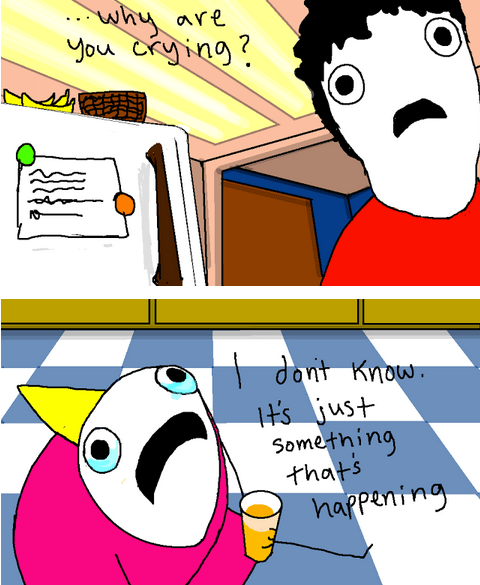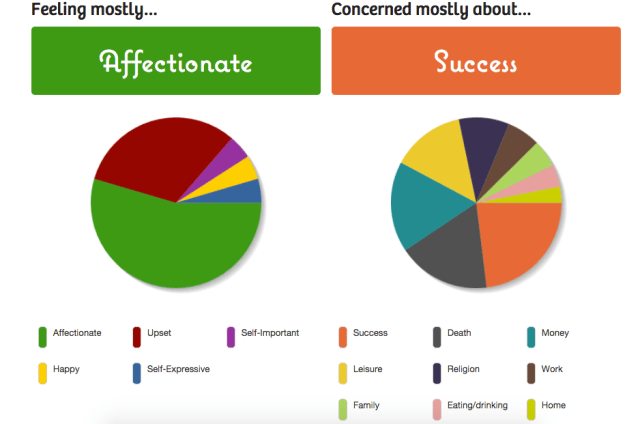feature image via Shutterstock
Welcome to You Need Help! Where you’ve got a problem and yo, we solve it. Or we at least try.
Q: I cry much more than I’d like to and at very inauspicious times. I feel like sometimes the way I handle myself and my feelings (which I tend to not even understand) is a stress on my relationship(s). I don’t really want to go to therapy, but I’m sick of the state of my mind and thoughts and emotions. I often get the urge to shrivel up and die. I don’t know what my question is. Help?
A: Well buttercup it sounds like you are very overwhelmed! Feelings are overwhelming things. But it’s really great that you’re looking into how to deal, because some people go their whole lives without figuring out what to do with their feelings or how to keep their emotional landscape from negatively impacting their relationships, so give yourself a high five and make yourself a grilled cheese for that.
Your intuition about going to a therapist is a solid one — I’ve been lucky to be able to get therapy in the past and it’s been really helpful for me, and I do think that seeing a qualified professional if you’re not sure how to deal with feelings, especially negative ones, is a really really good idea. Even if you don’t really feel into therapy or think of yourself as the kind of person who sees a therapist, it can still be hugely beneficial, sort of like how going to the gym is still good for your health even on days when you don’t feel like going.
However! Therapy isn’t a viable option for a lot of us, for a lot of reasons, and I get that. And some of us just aren’t ready to go yet, or may never be, even if we know it might be helpful. So without knowing exactly what’s on your plate or what specific strategies or interventions might be helpful for you, we can talk about some basic emotional how-to and stuff you can do to make being a human being who experiences emotions less of an endless hellscape. Unfortunately it’s probably not possible to figure out how to effectively cope with emotional distress in the space of one advice article — if that was possible therapy would be a way easier and more fun gig — but this can be a place to start. I’m not a therapist or a doctor; my expertise (“expertise”) here comes just from being a person who was, historically, terrible at dealing with having emotions, and now being a person who is less terrible at having emotions. *Law and Order sound* Here is that story.
What Even Are Feelings
I think it’s very astute, buttercup, that you note that you tend to not even understand your feelings. I think a lot of us, actually, are in this position — I know I spent years of my life stumbling around realizing “oh, I guess I’m crying now,” or “it appears I have suddenly stormed out of that room full of my friends,” and truly just having no idea why. Please don’t beat yourself up about this, because I think for a lot of us this lack of awareness was a survival mechanism; maybe we grew up in situations where if we had had to be fully aware of how not-good we felt, we would have been totally incapacitated and paralyzed, or we had to focus so much on other people’s feelings in minute detail so we could react to them and keep ourselves safe that we never had time for our own. But times have changed and now not knowing what you’re feeling is hurting rather than helping, so let’s work on that.

The best way I know of to check in with how you’re feeling is to literally make yourself check in with it, in a regular and concrete fashion. For at least one week, here’s what I want you to do: Pick a period of time that seems bearable, like two or three hours, and every X amount of time I want you to stop what you’re doing for a second and write down what’s going on and how you’re feeling. It’s not like a whole big diary entry, just sort of like this:
4 pm At work, about to go to meeting. Hungry, think I might be getting a headache. Feeling bored and irritated.
Literally that’s it! It doesn’t sound like much, but we’ve got to start somewhere; getting into the habit of regularly checking in with yourself and asking “how am I feeling right now?” a few times a day can only help. Or! Maybe it sounds like too much, and you’re like “I just SAID I don’t know how I’m feeling, how can I possibly do this.” If you have to write down “???” or “nothing,” then that’s not the end of the world. Have faith that if you keep asking yourself what feelings you’re feeling right now, you will eventually be able to come up with a stab at answer.
You can do this with a physical notebook or online or on a cave wall or whatever you wish, but it’s good to do this somewhere where you can refer back to what you’ve written later on. If you don’t trust yourself to do this on your own or using a notebook seems corny, great news, there’s an app for that. I like to use Pacifica, which asks you periodically to tell it how you’re feeling and also does other neat stuff, like track things that make you feel less shitty (sleep, exercise), give you meditations if you want them, and optional “challenges” aimed at making you feel better. If that doesn’t sound like something you’re into, there are a million other mood apps. In Flow, iMoodJournal, and MoodPanda are just a few.
Feeling Your Feelings
Okay! So at this point, after a week of writing down your feelings, you are hopefully feeling a little more comfortable with the knowledge that you have them, and a little more aware of what they are. Now it’s time to just DIVE IN THERE. Well okay we’re not diving. Think of it kind of like getting into a pool — it feels really cold at first so maybe you just dangle your feet in first, then walk in up to your knees, and so forth. The point is that you need to practice intentionally experiencing your emotions, even if it has to happen in little bits at first.
I feel like at this point everyone always recommends meditation. Which is a great recommendation! Probably there is no one on earth who could not benefit from meditation. The benefits of meditation — more self-awareness, less anxiety, stronger reserves of calm and self to call upon throughout the day — seem endless. It’s absolutely worth looking into! But not everyone can or wishes to meditate, so let’s also talk about what it feels like (to me) meditation is intended to accomplish for people in this specific position and other ways to do that as well.
On a very fundamental level, what we’re talking about here is hanging out with yourself. That’s what meditation could be. You know how when you’re hanging out with your best friend you can just tell when something’s wrong, because of the way she’s talking or not talking or her body language or how often she’s checking her phone? The aim here is to hang out with yourself in the same way, and pay loving attention to your own state of mind in the same way.
Speaking strictly for me, I know that when I felt/feel overwhelmed by having emotions I didn’t know how to deal with, I would often try to distract myself. Answer email, play a game on my phone, take care of a task for work, plan dinner for tomorrow, clean the apartment, sometimes do all of those things at once. What we’re aiming for here is the exact opposite of that. Whether you’re sitting on a pillow counting your breaths or not, the goal is to resist the impulse to dive in and engage (whatever that looks like) and instead just be there for a second.
Here’s what this often looks like for me, if that’s helpful: I’ll notice that I’m doing something which seems to indicate A Feeling — you mention crying at inauspicious times, which I sometimes do, but at other times it’s snapping angrily at someone for something that’s really not a big deal, or indulging in an anxious physical tic like picking at my face, or engaging in some extreme act of procrastination, like looking up every single thing Madchen Amick’s ever acted in because I don’t want to deal with something else. When I realize I’m doing something that means Something Is Going On, I can go into the bedroom with the lights off and sit or lie on the bed and be quiet and still and notice the feeling I’m having for at least five or ten minutes. I’m not allowed to do anything else. If I’m sad, it’s just sitting there feeling sad. If I’m anxious, it’s just sitting there being anxious. There isn’t a step two. I notice what it feels like — if I want to cry, if I’m running a single irrational thought into the ground, if I’m physically uncomfortable or exhausted. And most importantly, I notice that the world didn’t end; nothing bad happened. I didn’t distract myself by cleaning the pantry or deciding to start finding a bunch of new food blogs to read; I just felt sad, and nothing bad happened. I survived it.
For people who intuitively know how to deal with emotions, this probably sounds dumb and lame! It’s useful, though: the first step in getting through, as you call it, “the urge to shrivel up and die” is to accept that even though they are sometimes terrible feelings will not actually make you shrivel up and die. They just happen, and you keep on living, and they keep on happening, and you keep on living, and that’s the way it works.
There are more active ways of doing this, too, which may sound less woo-woo and/or stupid to you. The obvious one is, of course, journaling — I KNOW that everyone always tells you to journal, but they’re right! Again, there are a zillion ways to do this, from paper and pen to a secret gmail account to an old-school livejournal. I’ve been very into 750 Words for a while now; it’s good for situations like this where you know that journaling would be good for you but have trouble getting into the journaling as such. It gives you a benchmark to hit each day, which is helpful because I find the longer you “have to” type for the more into your own stuff you end up getting, and the more obvious patterns and trends you can see. (For instance, I’ve noticed that when I’m stressed out I often end up typing out endless to-do lists or lots of sentences that start with “I should…” or “I need to…”, which now functions as kind of a tell for me.) And it can also analyze your writing and provide you with stats about it, which is useful if you’re trying to figure out how feelings work.

It’s useful to just write something; there are things you’re thinking that you aren’t even aware of until you tell yourself that you have to write down what you’re thinking, and then you might be amazed at what comes out. The idea here is that once you are at least marginally aware of their existence, you need to treat your feelings like a randomly assigned roommate that you have to live with indefinitely: make a point of hanging out with them even if you don’t totally feel like it all the time, because they’re not going anywhere and it will be a lot easier if you can at least be amicable. And to do that, you have to show up, and keep showing up, in an intentional way. I know! It sounds awful. Life is a box of chocolates, I don’t know what to tell you.
The Ball’s In Your Court Now, Kiddo
This is where we must part ways, buttercup, because you have graduated basic feelings training and no one knows more about this next part than you do. If you continue to do this stuff fairly regularly, you will a) have at least a ballpark estimate of what your feelings are and b) be able to experience having those feelings at least long enough to understand what’s going on. That doesn’t answer the question, though, of what to do about them; that’s because that’s such a personal question no article on the internet could ever figure it out for you in one fell swoop.
It’s on you to look at yourself and the tapestry of your life and figure out where the fault lines are, where the patterns have revealed themselves, and to get to know yourself well enough to figure out what to do. For instance, do you find yourself feeling anxious and self-loathing immediately before/after meetings with your boss? Ok, then that’s something you need to dig into and figure out whether you need to change something about those interactions, or she does, or what. Do you feel really hopeless when you and your partner fight about X but not about Y? Then you have to figure out what’s going on with X, whether there’s a different way to have a discussion about it, etc. This is where all your work on this comes in handy — when you have notes and journal entries for weeks and months and years, it’s a lot easier to figure out what’s going on in your head and what to do about it than when you’re just by yourself in the moment feeling alone in your apartment and you’re out of Fritos. Sometimes it’s terrifyingly simple — sometimes as soon as you let yourself realize something like “I’m really angry,” the reasons why and what you have to do about it are suddenly obvious (which can be even scarier; sometimes we avoid recognizing our own feelings because we’re afraid of acting on them).
I know this all sounds like it will be a lot of uphill work, and in some ways it is. It’s also a much more helpful and affirming process than it sounds. Did you ever play a sport, querent person, or try to improve at one? If you did, then you know that the secret isn’t necessarily in exhaustive studying or figuring out any secret formula. The secret is mostly showing up every single day, even when you’re tired or sore or hungover, and throwing the ball and catching the ball and whatever else. And even if you can’t put your finger on when it happened or how, and even though you don’t suddenly have access to some secret vault of knowledge that you didn’t previously, you realize at some point down the line that things have changed radically, and that you’re now actually pretty fucking good at this sport. That’s all I’m asking you to do: just show up for yourself, and try to figure it out every day that you can, and I promise that this will get easier, and that being you will get easier. I don’t know that I was 100% sure what your question was either but maybe this helped.
If you really do feel like you want to die, though, you really do need to see a doctor, or at the very least, reach out to a close friend or family member (if possible) or call a hotline. In the US, the National Suicide Prevention hotline is 1-800-273-8255; the LGBT-specific Trevor Project lifeline is 866-488-7386, and you can also text or chat with someone if you’d prefer not to use the phone. The trans-specific Trans Lifeline, staffed by all transgender people, is (877) 565-8860 in the US and (877) 330-6366 in Canada. If you’re not in the US or Canada, you may be able to find a lifeline for you here. I’m not a doctor but it is possible you are suffering from depression or perhaps another condition — and let me again stress that I AM NOT A DOCTOR, but if doing all of this doesn’t get you anywhere, or if you find that it gets you somewhere but you need to get farther, you probably should seek one out. There are a few different databases for finding an LGBT-friendly therapist; hopefully one will help you find a mental health care provider that you feel comfortable with.







